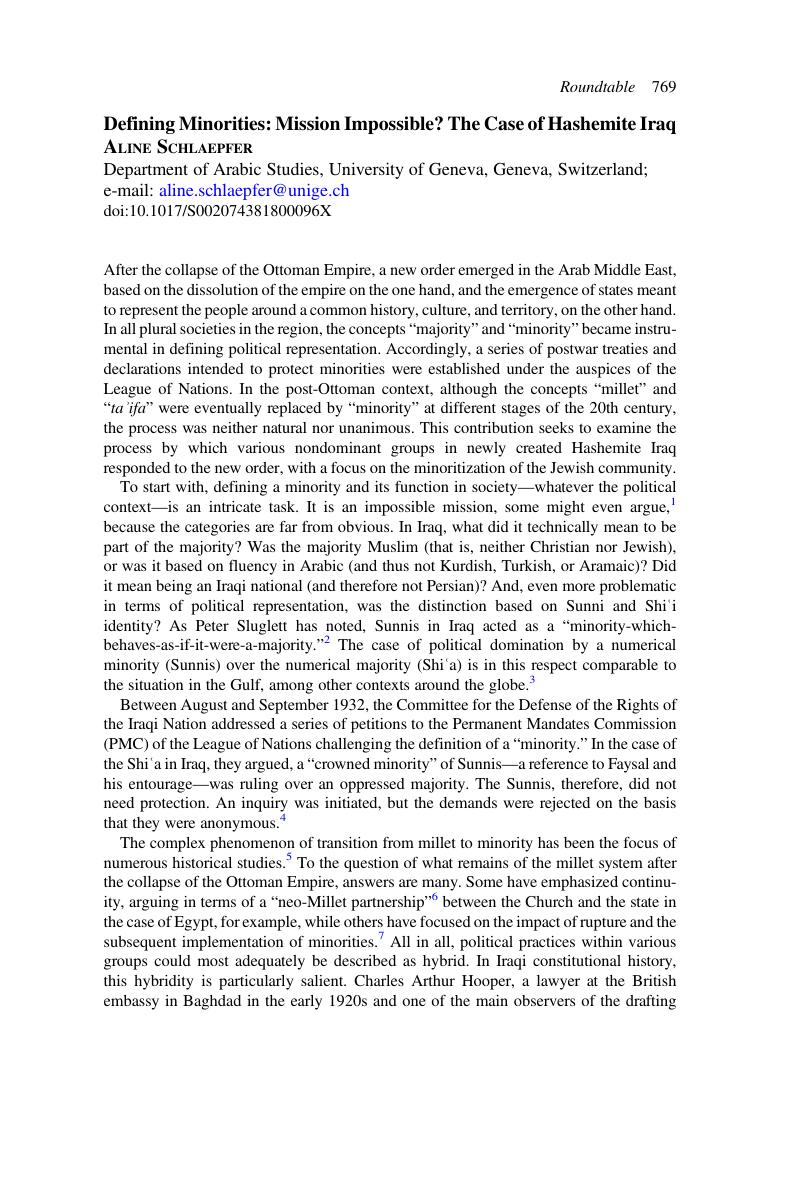No CrossRef data available.
Article contents
Defining Minorities: Mission Impossible? The Case of Hashemite Iraq
Published online by Cambridge University Press: 28 November 2018
Abstract

- Type
- Roundtable
- Information
- Copyright
- Copyright © Cambridge University Press 2018
References
NOTES
1 “Les minorités: l'impossible définition en droit international,” in Le droit et les minorités: analyses et textes, ed. Fenet, Alain, Koubi, Geneviève, and Schulte-Tenckhoff, Isabelle (Bruxelles: E. Bruylant, 2000 [1995]), 18–24Google Scholar; Rigaux, François, “Mission impossible: la définition de la minorité,” Revue trimestrielle des droits de l'homme 30 (1997): 155–75Google Scholar.
2 Sluglett, Peter, “From Millet to Minority: Another Look at the Non-Muslim Communities in the Late Nineteenth and Early Twentieth Centuries,” in Minorities and the Modern Arab World: New Perspectives, ed. Robson, Laura (Syracuse, N.Y.: Syracuse University Press, 2016), 19Google Scholar.
3 Beaugrand, Claire, “Deconstructing Minorities/Majorities in Parliamentary Gulf States (Kuwait and Bahrain),” British Journal of Middle Eastern Studies 43 (2016): 234–49CrossRefGoogle Scholar.
4 P. Anker to Vito Catastini, 10 October 1932; Vito Catastini to Alberto Theodoli, Geneva, 10 October 1932; Theodoli to Catastini, Rome, 26 October 1932 ; Le Comité central de la Défanse (sic) des Droits de la nation iraquienne, “La voix étouffée d'Irak,” Baghdad, August 1932 (LN, R2176/4/35957).
5 On the emergence of the concept “minority,” see, e.g., White, Benjamin Thomas, The Emergence of Minorities in the Middle East (Edinburgh: Edinburgh University Press, 2011)CrossRefGoogle Scholar; Shami, Seteney, “Aqalliyya/Minority in Modern Egyptian Discourse,” in Words in Motion: Toward a Global Lexicon, ed. Gluck, Carol and Tsing, Anna Lowenhaupt (Durham, N.C.: Duke University Press, 2009), 151–73CrossRefGoogle Scholar; Robson, Minorities and the Modern Arab World; Fuccaro, Nelida, “Minorities and Ethnic Mobilisation: The Kurds in Northern Syria and Iraq,” in The British and French Mandates in Comparative Perspectives, ed. Méouchy, Nadine and Sluglett, Peter (Leiden: Brill, 2004), 579–95Google Scholar; Fuccaro, , The Other Kurds: Yazidis in Colonial Iraq (London: I.B.Tauris, 1999)Google Scholar; Tejel, Jordi, “The Monarchist Era Revisited,” in Writing the Modern History of Iraq: Historiographical and Political Challenges, ed. Bocco, Ricardo, Bozarslan, Hamit, Sluglett, Peter, and Tejel, Jordi (London: World Scientific, 2012), 87–94CrossRefGoogle Scholar; Tejel, , La question kurde: Passé et present (Paris: L'Harmattan, 2014)Google Scholar; Murre-van den Berg, Heleen, “Searching for Common Ground: Jews and Christians in the Modern Middle East,” in Modernity, Minority, and the Public Sphere: Jews and Christians in the Middle East, ed. Goldstein-Sabbah, S.R. and Murre-van den Berg, H.L. (Leiden: Brill, 2016), 3–38CrossRefGoogle Scholar; Laura Robson, “Refugee Camps and the Spatialization of Assyrian Nationalism in Iraq,” in Modernity, Minority, and the Public Sphere, 237–57; Helen Müller-Sommerfeld, “The League of Nations, A-Mandates and Minority Rights during the Mandate Period in Iraq (1920–1932),” in Modernity, Minority, and the Public Sphere, 258–83; and Mahmood, Saba, Religious Difference in the Secular Age: A Minority Report (Princeton, N.J.: Princeton University Press, 2015)Google Scholar.
6 Rowe, Paul S., “Neo-millet Systems and Transnational Religious Movements: The Humayun Decrees and Church Construction in Egypt,” Journal of Church and State 49 (2007): 329–50CrossRefGoogle Scholar.
7 Maʿruf, Khaldun, al-Aqalliya al-Yahudiyya fi al-ʿIraq bayna Sanat 1921 wa-1952 (Baghdad: Baghdad University, 1975)Google Scholar.
8 London, 20–22 December 1927 (BNA, CO 730/125/9). The results of his inquiry in Baghdad were published in a book titled The Constitutional Law of ‘Iraq (Baghdad: Mackenzie and Mackenzie, 1928).
9 Appendix to the letter by Nigel G. Davidson, Baghdad, to J.H. Thomas, Secretary of State for the Colonies, London, 24 July 1924 (BNA, T 161/158).
10 I discuss these aspects in more detail in “Entre communauté et minorité juive: Les défis de la transition en Irak au moment de l'indépendance,” in Minorités en Méditerranée aux XIXe et XXe siècles, ed. Valérie Assan, Bernard Heyberger, and Jakob Vogel (Rennes: Presses universitaires de Rennes, forthcoming).
11 Brown, L. Carl, “The Setting: An Introduction,” in Imperial Legacy: The Ottoman Imprint on the Balkans and the Middle East, ed. Brown, L. Carl (New York: Columbia University Press, 1996), 8Google Scholar.
12 Pedersen, Susan, “Getting Out of Iraq—in 1932: The League of Nations and the Road to Normative Statehood,” The American Historical Review 115 (2010): 984CrossRefGoogle Scholar. See also Pedersen, Susan, The Guardians: The League of Nations and the Crisis of Empire (Oxford: Oxford University Press, 2015)CrossRefGoogle Scholar.
13 “Memorandum on the League of Nations’ Union and Guaranties for Minorities in Iraq,” 8 December 1931 (BNA, CO 730/172/5).
14 Helen Müller-Sommerfeld, “The League of Nations, A-Mandates and Minority Rights,” in Modernity, Minority, and the Public Sphere, 258–83.
15 Secret Report, Appendix A “The Jews of Iraq,” 9 July 1934 (BNA, AIR 23/806), in Records of Iraq, 1914–1966, ed. Alan de L. Rush (Slough: Archives Ed., 2001), 7:630.
16 Qanun al-Ta ʾ ifa al-Isra ʾ iliyya Raqm 77 (Bagdad: s.n., 1932).
17 R. Brooke-Popham, Baghdad, to Colonial Secretary, London, 26 September 1930 (BNA, CO 730 152 2). For more detailed analysis of the relationship between the Jewish community and Britain in Iraq, see Bashkin, Orit, New Babylonians: A History of Jews in Modern Iraq (Stanford, Calif.: Stanford University Press, 2012)Google Scholar; and Schlaepfer, Aline, Les intellectuels juifs de Bagdad: Discours et allégeances (1908–1951) (Leiden: Brill, 2016)CrossRefGoogle Scholar.
18 J. Rich, London, to P. Azcaratè, Geneva, 9 December 1931 (LN, S345/2).
19 Ibrahim, Vivian, review of Religious Difference in a Secular Age: A Minority Report, by Mahmood, Saba, Middle East Journal 70 (2016): 507–8Google Scholar.


